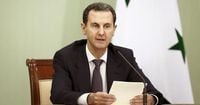In a story that reads almost like a Cold War thriller, former Syrian president Bashar al-Assad has survived an apparent assassination attempt by poisoning while living in exile in Russia, according to multiple reports from the Syrian Observatory for Human Rights (SOHR) and other sources. The incident, which unfolded in September 2025, has cast a new spotlight on the fate of the deposed leader, the intricate geopolitics surrounding his asylum, and the ongoing instability in Syria itself.
Assad, who ruled Syria for two decades before being ousted in December 2024, was rushed to a hospital on the outskirts of Moscow after reportedly falling critically ill from poisoning. The SOHR, a UK-based monitoring group with a long history of reporting on Syrian affairs, broke the news on its official account, stating that Assad was the target of a deliberate poisoning operation. The organization’s director, Rami Abdul Rahman, cited a “reliable source” who claimed the attack was orchestrated not just to eliminate Assad, but to embarrass the Russian government and potentially accuse it of complicity in his death.
“We asked the Russian authorities to clarify what happened and who poisoned him,” Rahman wrote, adding, “The source confirmed that the Russian government had nothing to do with the matter, but it may have been intended to implicate the Russian government.” According to SOHR, the perpetrators behind the poisoning were not linked to either the Syrian or United States governments, deepening the mystery around who might have orchestrated the plot and why.
During his hospitalization, access to Assad was tightly controlled. Only his brother, Maher al-Assad, and his former Secretary-General of Presidential Affairs, Mansour Fadlallah Azzam, were permitted to visit him. Security around the hospital was described as intense, with Russian authorities keeping a close guard over the patient and his visitors, according to reports in The Express and The Daily Beast. Assad’s condition, initially critical, stabilized by the end of September, and he was quietly discharged from the medical facility.
The Russian government has so far remained silent on the incident. No official statement has been issued by the Kremlin or the Russian Foreign Ministry, and the secrecy surrounding Assad’s whereabouts and condition has only fueled speculation. Since his arrival in Russia, Assad, now 60, has not been seen in public and is believed to be living under the close watch of Russian secret services. He reportedly resides in a heavily guarded villa near Moscow, along with family members and close aides.
Assad’s flight to Moscow capped a dramatic turn in Syria’s long-running conflict. In late November 2024, Syrian rebels—galvanized by a series of airstrikes on Idlib—launched a sweeping offensive, capturing key cities including Aleppo, Hama, and even Damascus itself. With his regime collapsing, Assad fled to Russia, which publicly promised to support his loyalist troops but ultimately granted him asylum. The Russian Foreign Ministry later announced that Assad had resigned and left the country, paving the way for a peaceful transfer of power.
The fall of Assad’s regime was welcomed by world leaders, and Ukraine, among others, restored diplomatic relations with Syria. The new authorities in Damascus, led by Ahmed al-Sharaa (known by his nom de guerre Abu Mohammad al-Jolani), have repeatedly demanded Assad’s extradition. However, Russia has steadfastly refused, citing humanitarian considerations and the personal intervention of President Vladimir Putin, who is said to have granted Assad asylum himself.
Assad’s life in exile is shrouded in both secrecy and controversy. Reports suggest his family’s wealth could be as high as $2 billion, with real estate holdings in Moscow alone estimated at more than $40 million. The family’s assets are believed to be hidden through an array of offshore accounts, shell companies, and luxury properties. Neither Assad nor his family has been seen publicly since their arrival in Russia, and speculation about their activities and health has only increased in the wake of the poisoning attempt.
Earlier, unconfirmed reports from the Daily Mail noted that Assad complained of feeling unwell and experiencing breathing difficulties during his first month in Moscow. While there is no independent confirmation of these accounts, they add to the sense of intrigue and uncertainty surrounding his current status. Meanwhile, Assad’s wife, Asma, is said to be battling leukemia, with her father telling The Daily Beast that she wishes to return to London for better medical care.
The alleged assassination attempt has also cast a shadow over Russian-Syrian relations. Some analysts suggest that the operation may have been designed to destabilize the already fragile relationship between Moscow and Damascus, or to send a message to other exiled leaders about the limits of Russian protection. Others point to the broader context of regional rivalries and ongoing violence in Syria, where the new HTS-led regime faces widespread insecurity and mounting pressure on minorities.
Despite the dramatic nature of the poisoning, there is so far no independent evidence confirming the attack. Fact-checking site Snopes, for example, has expressed skepticism about some of the more sensational claims circulating online, especially those originating from anonymous Telegram accounts. Still, the consistency of reports from SOHR and corroborating details from multiple media outlets lend credibility to the core narrative: Assad was indeed hospitalized, his condition was serious, and he has since recovered—at least physically.
For Syria, the saga of Bashar al-Assad’s exile and near-death experience in Russia is just one more chapter in a tumultuous recent history. Since Assad’s ouster, the country has struggled with chronic instability, and the new government continues to face daunting challenges. Calls from the new Syrian leadership for Russia to “rebuild trust with the Syrian people” through compensation, reconstruction, and recovery have so far gone unanswered.
As the dust settles, questions linger: Who really wanted Assad dead, and why? Was it a warning, a vendetta, or a calculated move in a much larger geopolitical chess game? For now, the answers remain elusive—but the story of Bashar al-Assad’s poisoning in Moscow is sure to reverberate through the corridors of power in both Russia and the Middle East for some time to come.





